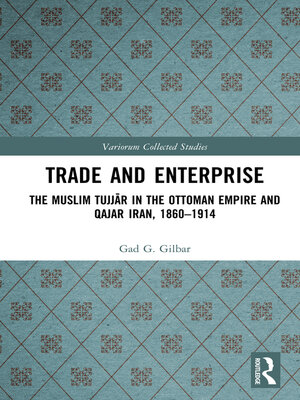Trade and Enterprise
ebook ∣ The Muslim Tujjar in the Ottoman Empire and Qajar Iran, 1860-1914 · Variorum Collected Studies
By Gad Gilbar

Sign up to save your library
With an OverDrive account, you can save your favorite libraries for at-a-glance information about availability. Find out more about OverDrive accounts.
Find this title in Libby, the library reading app by OverDrive.



Search for a digital library with this title
Title found at these libraries:
| Library Name | Distance |
|---|---|
| Loading... |
Until recently, the historiography of Middle Eastern economic elites during the first globalization has ignored the significant role played by Muslim tujjār (big merchant-entrepreneurs). Foreign firms and local minorities were considered the prime agents of economic change and the initiators of economic growth.
The 12 studies in this volume show that the Muslim tujjār played a major economic role in various regions of the Middle East during the late nineteenth and early twentieth centuries. Their investments, mainly in commercial agriculture, resulted in economic growth and changed economic structures and social relations in many Middle Eastern communities. They were also involved in political developments, some of which had a dramatic effect on the history of their countries, as for instance in late Qajar Iran. They also played a unique role in the process of cultural change. Although they supported the ʿulamāʾ financially, they also contributed to the establishment of new educational and cultural institutions. The story of the tujjār is unique in the sense that it was the only indigenous elite group in the pre-World War I Middle East to bridge between traditional forces and concepts and Western attitudes and practices. (CS 1108).







